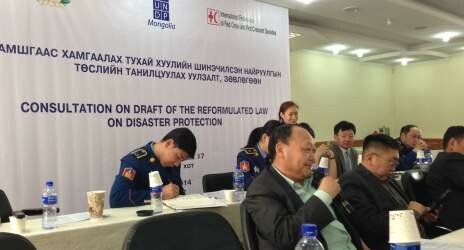
At a consultation workshop on 17 March 2014 in Ulaanbaatar, government representatives, the Mongolian Red Cross Society and humanitarian agencies shared their views on Mongolia’s draft revised Law on Disaster Protection and in particular, the new chapter based on the IDRL Guidelines.
Mongolia is exposed to a wide range of natural hazards, including blizzards, floods, wildfires, drought and in particular, dzuds which are severe winters causing widespread death of livestock. According to the Deputy Chief of Mongolia’s National Emergency Management Agency (NEMA), Mr T. Badral, having a strong legal foundation for those situations will be crucial to “moving ahead” and strengthening preparedness measures in Mongolia. Mr Badral emphasised that “international assistance could be needed at any time, and the legal preparedness of the hosting country is especially important.”
The draft chapter on international humanitarian assistance is primarily based on recommendations contained in the IDRL Guidelines and the Model Act for International Disaster Assistance. The new chapter sets out a procedure for determining the need for external assistance, and for requesting, accepting and coordinating assistance. It requires a waiver of all taxes and fees on the goods and services provided by international humanitarian agencies, but provides that all goods and services must meet the needs of those affected and comply with “minimum standards of humanitarian aid.” It also prohibits discrimination in the distribution of aid based on social origin, nationality, religion, gender, sexual orientation, disability, age and political opinion, as well as seeking “financial profits” when providing assistance.
To promote future implementation of the revised law, NEMA sought the views and comments from a range of ministers, officials, international and national organisations, providing an opportunity to address potential gaps and challenges in the revised law. Some of the key issues raised by participants included:
- Which agency will coordinate and monitor international assistance;
- Who will make an assessment of the need for international assistance;
- Whether a pre-registration procedure should be established for the aid providers.
Comments provided by the participants at the workshop will now be consolidated and reviewed by the working group responsible for drafting the revised law. The next version will incorporate the suggestions provided during the consultation workshop, and will be circulated for comment in the coming months. Speaking about the significance of revising the law, and the need to ensure the swift and efficient facilitation of international assistance, Mr. Badral reiterated that “in the end, the new law will be for the benefit of the Mongolian people.”